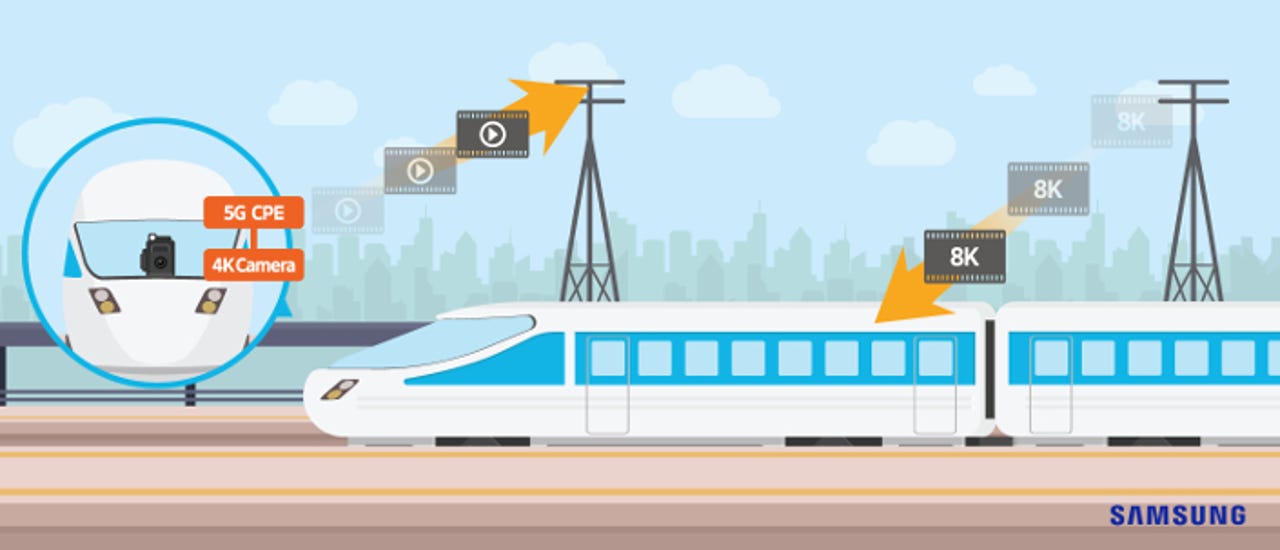Samsung tests 5G on Japanese high-speed train


Samsung has announced completing a 5G demonstration on a moving train in partnership with Japanese telecommunications carrier KDDI, achieving peak speeds of 1.7Gbps as well as downlink/uplink handover.
Samsung's pre-commercial 5G solution -- incorporating a 5G router, 5G radio access unit, virtualised RAN (vRAN), and virtualised core -- was used for the test.
The train was travelling faster than 100km/h between two stations in Saitama, Japan, with each station around 1.5km away. The tests included 8K video being downloaded by the 5G router on-board, and 4K video filmed from a camera atop the train being uploaded.
According to Samsung, the tests show how 5G could be used by high-speed train passengers, including as backhaul for on-board Wi-Fi, and for improved passenger entertainment and information services with security and analytics built in.
"In collaboration with Samsung, KDDI has opened up the possibility for new 5G vertical business models, such as a high-speed train," said Yoshiaki Uchida, KDDI senior managing executive officer.
"With 5G expected to bring railway services to a whole new dimension, the success of today's demonstration in everyday locations such as a train and a train station is an important milestone indicating 5G commercialisation is near."
Uchida said KDDI aims to launch 5G by 2020, and will continue researching and trialling use cases, spectrum bands, and technologies with Samsung, which it has worked with on millimetre-wave (mmWave) 5G solutions since 2015.
Samsung has also been working with SK Telecom on 5G trials, in September announcing the first handover between 2.6GHz spectrum 4G LTE and 28GHz and 3.5GHz spectrum 5G networks.
SK Telecom and Samsung had built a 4G and 5G radio station with virtual core networks using different spectrums near the carrier's headquarters in Euljiro, Seoul, using the tests to stream 360-degree virtual reality (VR) video from the HQ to the moving vehicle.
Samsung also partnered with Charter Communications in the United States for a series of 5G lab and field trials to evaluate the use of mmWave spectrum at the 28GHz band in September.
The electronics giant is similarly collaborating with Sprint on advanced mobile networking, as well as with Verizon, T-Mobile, and AT&T.
Verizon in May deployed its first 5G trial network using Samsung vRAN solutions, Samsung 5G radio base stations, and Samsung 5G routers in Ann Arbor, Michigan, and in the telco's remaining 10 5G trial networks in Atlanta, Georgia; Bernardsville, New Jersey; Brockton, Massachusetts; Dallas, Texas; Denver, Colorado; Houston, Texas; Miami, Florida; Sacramento, California; Seattle, Washington; and Washington DC.
AT&T is similarly making use of Samsung's 5G router, 5G radio frequency integrated circuit (RFIC) chipset, virtualised core, and vRAN in its network deployments in 20 metro areas across the US.
Samsung and T-Mobile worked on 5G lab tests and field trials throughout 2017 using Samsung's 5G proof-of-concept beam-forming technology in outdoor trials, as well as its pre-commercial system in combination with T-Mobile's 28GHz mmWave spectrum.
Samsung has developed a 5G antenna and a power amplifier and a 5G RFIC that will be used in base stations and radio access products.
Related Coverage
Verizon 5G to launch in Sacramento in 2018
Verizon will be launching between three and five commercial 5G networks across the US over the next two years, starting with Sacramento in the second half of 2018.
Flagship smartphones: Specs, benchmarks and prices for iPhone, Samsung, Huawei and more
Updated to include OnePlus 5T, BlackBerry Motion and HTC U11+ specs. Here's how the top end of the smartphone market looks at the moment.
5G to reach 20 percent globally by 2023: Ericsson
Use cases across the automotive, manufacturing, utilities, and healthcare industries will drive 5G to the point of 1 billion subscriptions by the end of 2023, according to Ericsson.
NTT DoCoMo develops multi-profile SIM for international roaming
A new SIM developed by NTT DoCoMo will allow customers to switch between profiles, phone numbers, and contracts when they travel overseas to other Conexus Mobile Alliance nations in the Asia-Pacific region.